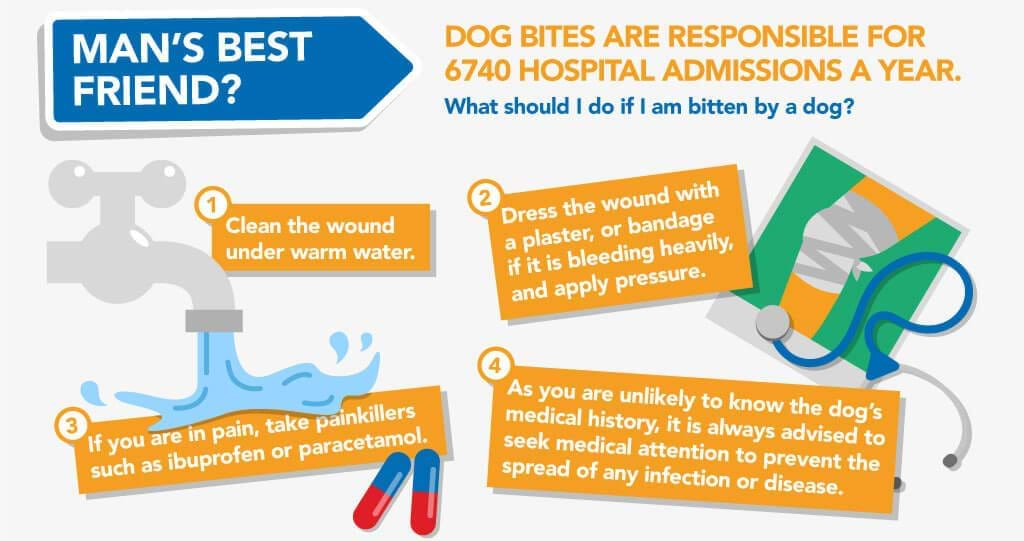What to Do After a Dog Bite and How to Report It

It can be difficult to know what to do after suffering a dog bite, whether it was from a friend’s dog or a complete stranger’s. You’ll likely be in shock, and you may be feeling unsure of what to do next.
In this guide, we’ve outlined the signs to look out for when a dog is about to bite, as well as explaining what to do if you’re bitten by a dog.
Signs a dog is going to bite
Most of us know to be weary of a dog that’s growling or snarling. But there are more subtle signs that a dog could be about to bite, too. These include:
- A ‘puffed up’ or tense stance – some dogs will try to appear bigger when they feel threatened by puffing up their chest and standing with their legs further apart
- An upright or arched tail
- Direct eye contact – this could be threatening behaviour, especially if the dog’s body is also rigid or tense
- Ears up or perked – in some breeds, flattened ears can also be a sign of extreme discomfort which can lead to aggression
- Exposed front teeth
- Low rumbling growls
- Raised fur (or hackles), usually from the base of the dog’s head down to their tail
- ‘Tucked in’ tails or cowering – this could mean the dog is scared and they may bite to protect themselves
If you see a dog exhibiting any of these behaviours, back away slowly if you can and try to avoid making eye contact.

What to do if a dog bites you
1. Clean the wound
To help prevent the spread of infection, clean the wound immediately by running warm water over it. Even if the skin hasn’t been broken by the dog bite, this will still help to reduce swelling.
2. Apply a plaster or dressing
Make sure any dirt or fur has been removed from the wound before applying a plaster or dressing. If you’re bleeding heavily, try your best to apply pressure to the area after the dressing has been applied.
3. Seek medical attention
Even if you don’t think the bite is that bad, it’s important that you see a medical professional. Dogs can carry diseases, which means you may be vulnerable to infection if you don’t receive the right treatment. This is especially important if a dog bites you and breaks the skin.
After taking these steps, you should consider reporting the attack to the local authorities.

How do you report a dangerous dog?
You can report a dog attack by calling 101 or by contacting your local dog warden. But if you or anyone else is in immediate danger, you should call 999 immediately.
Try to keep a record of any important details – such as the date and time of the attack, where it happened, what the dog and its owner looked like and any witness contact details you have. This information will help the local authorities make a decision on what will happen to the dog.
After reporting the attack, you’ll be kept up to date with the next steps.
What happens when a dog bite is reported?
This will largely depend on the breed of the dog that bit you and whether they’re allowed to be owned under UK law.
Dogs banned under the Dangerous Dogs Act 1991 include the Dogo Argentino, Fila Brasileiro, Japanese Tosa and Pit Bull Terrier. From February 2024, it will also be a criminal offence to own an XL Bully in England and Wales without a Certificate of Exemption.
If you’re bitten by one of these dogs – or a cross-breed of these dogs – then the owner has broken the law and the attack should be reported to the police. In most cases, this will result in the dog being put down and the owner receiving a fine or prison sentence (or both).
Even if you’re bitten by a dog that isn’t banned, the incident should still be reported. In these instances, the police or local dog warden will consider the circumstances of the attack and decide whether the dog poses a threat to the general public.
If the owner of the dog that bit you is found to have been negligent, you may also be able to claim for damages under the Animals Act 1971. This will usually apply if the dog has attacked someone before, or if the attack could have been prevented by the owner.
To find out more about claiming compensation after a dog attack, get in touch with our friendly advisors. You can give us a call on the number at the top of the screen or fill in our quick and easy online form.
Note: First4Lawyers offers this information as guidance, not advice. Before taking any action, you should seek professional assistance tailored to your personal circumstances.

